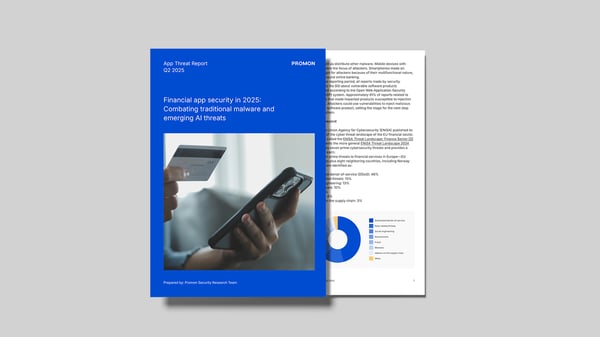App security you can practically push to start
Security that drives your automotive brand forward
- Secure your "phone-as-a-key" feature with no impact on performance
- Streamline operations between developer and security teams
- Simple, post-compile integration fits into your development timelines
- Maintain full data control with on-prem deployment
- Proactive protection from evolving threats without added internal resources
- Face emerging challenges with confidence, like protecting Android Automotive OS
Take the wheel of your automotive app security
-
1
Prevent unauthorized access
Reverse engineering can expose app vulnerabilities, allowing hackers to access vehicle systems or sensitive features.
-
2
Protect intellectual property
Safeguard proprietary algorithms and technologies from being stolen or copied by competitors or bad actors.
-
3
Ensure safety and trust
App tampering can compromise functionality, endanger user safety, and damage your brand's reputation.
-
1
Mobile app protection at rest
Protect sensitive app and vehicle data with layered encryption, preventing unauthorized access or breaches, even if the device is lost or stolen.
-
2
Defend against active threats
Runtime protection defends apps against real-time threats like code injection and malware, ensuring secure operation in untrusted environments.
-
3
Holistic security
Combining at-rest and runtime protection secures stored data and defends against real-time threats, ensuring comprehensive security for connected vehicles.
-
1
Convenience and performance
Secure your brand’s phone-as-a-key feature, and the in-app secrets that power it with no impact on performance.
-
2
Lock away the keys
Leaving cryptographic keys exposed is like leaving a car key on a tire. Non-secure sensitive assets can compromise an app's entire security.
Secure your automotive app’s intellectual property
-
Preserve proprietary technology
Safeguard critical algorithms and processes from reverse engineering to protect your competitive edge. -
Shield sensitive APIs
Prevent attackers from exploiting APIs and accessing vital code infrastructure. -
Maintain system integrity
Ensure your app’s core functions and processes remain uncompromised, preserving safety and reliability. -
Reinforce security defenses
Protect your app from unauthorized modifications, maintaining its performance, reputation, and user trust.
Multi-layered protection for automotive apps
-
Safeguard your app from client-side attacks
Automotive mobile apps that connect directly to vehicles are acting as an extension of the system and they are susceptible to client-side attacks, which could directly compromise the vehicle itself. -
All the in-vehicle entertainment, without the drama
Protect the first and third-party apps that keep your customers engaged. Platforms like Android Automotive OS allow for more experiential customization, but also mean the first and third party apps that run directly on the vehicle’s software infrastructure pose a significant risk to the vehicle itself if they are reverse engineered, compromised, or manipulated in any way. -
Keep your customer PII secure
Protecting customer data is important from a regulatory perspective, but it's also key in preventing fraud and misuse of customer PII. Breaches and incidents stemming from your app and systems can erode customer confidence, damage the brand’s reputation, and lead to hefty penalties.
Secure the backbone of your automotive app experience
-
Prevent unauthorized access
API protection ensures only authorized users and devices can interact with critical vehicle systems, preventing misuse of features like remote unlocking or diagnostics. -
Safeguard sensitive data
Protect personal and vehicle data transmitted through APIs, preventing interception, theft, or tampering during communication. -
Defend against threats
Shield APIs from attacks like injection, DDoS, or reverse engineering, maintaining the integrity and functionality of connected car applications.
Real-time analytics for automotive app security
-
Monitor automotive app security in real time
Understanding your app’s security is crucial for protecting connected vehicles and customer data. Promon Insight for App Security™ provides actionable analytics to identify vulnerabilities and threats early, with detailed event tracking to stay proactive. This data-driven approach helps automotive brands mitigate risks, prevent breaches, and enhance app and vehicle security. -
Strengthen security with evidence-based intelligence
Insight for App Security provides actionable insights and security reports to help automotive brands address threats and optimize defenses. Move from reactive to proactive protection with Promon Insight™.
Your questions answered
What’s the most common challenge you hear with regard to protecting automotive apps?
The biggest challenge in protecting automotive mobile applications is securing apps in untrusted environments. Mobile apps often operate on user controlled devices that can be jailbroken, rooted, or infected with malware, making them vulnerable to reverse engineering, tampering, and data theft.
This is further complicated by the increasing reliance on connected features like remote access and diagnostics, which expose critical vehicle systems to potential exploitation. Ensuring robust protection without compromising app performance or user experience is a constant balancing act for automotive brands.
What are the most common attack vectors for automotive mobile apps?
There are several attack vectors to mention here because of the complexity of connected vehicle’s systems and usage.
1. Reverse engineering
Attackers analyze app code to uncover vulnerabilities, extract cryptographic keys, or gain access to sensitive vehicle controls like remote unlocking or diagnostics.
2. App tampering and repackaging
Modified apps with malicious code can be redistributed to unsuspecting users, potentially compromising vehicle systems or stealing user data.
3. Man-in-the-Middle (MitM) attacks
Intercepting communication between the app and the vehicle or backend servers can expose sensitive data or allow attackers to issue unauthorized commands.
4. API exploitation
Weakly secured APIs can be exploited to access sensitive data, vehicle functions, or backend systems.
5. Insecure data storage
Poorly secured storage of sensitive information (e.g., user credentials, vehicle keys, or PII) can allow attackers to extract data from the app or device.
6. Credential theft
Attacks like phishing or poor authentication practices can compromise user credentials, granting unauthorized access to app features and vehicle systems.
7. Malware injection
Malware on user devices can exploit app vulnerabilities to compromise vehicle functionality or steal sensitive data.
8. Code injection attacks
During runtime, attackers manipulate app behavior by injecting malicious code to bypass security measures or issue unauthorized commands.
9. Device-level vulnerabilities
Jailbroken or rooted devices expose automotive apps to deeper system-level attacks, increasing the risk of unauthorized access or tampering.
10. Cloning and app impersonation
Cloned or counterfeit apps can mislead users, capturing their credentials or issuing unauthorized vehicle commands.
How does Promon Shield for Mobile™ prevent app tampering and malware attacks?
Promon Shield for Mobile™ uses runtime application self-protection (RASP), code obfuscation, and anti-tampering mechanisms to block unauthorized access and modifications. It detects and prevents malware from compromising app functionality or accessing sensitive information, delivering robust, real-time protection.
What information does Promon Insight for App Security™ provide?
Promon Insight for App Security™ delivers actionable analytics and real-time monitoring of app security events. It helps security teams detect vulnerabilities and respond to threats quickly, improving overall security posture. This data-driven approach empowers teams to proactively address risks and optimize defenses.
You might also like this
Helping the automotive industry focus on what matters most
Cybersecurity predictions for 2026: A peek into Promon's crystal ball

App Threat Report 2025 Q2: Financial App Security in 2025: Combating Traditional Malware and Emerging AI Threats

Mobile app vs. mobile device security: What are the differences?



